Overview
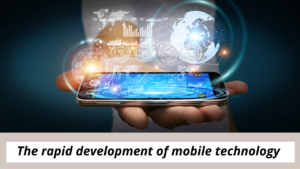
Modern society has been completely changed by mobile technology, which is now a necessity for daily existence. The way we live, work, and interact has been completely transformed by mobile phones and related technologies, which range from basic communication tools to advanced platforms that can perform intricate tasks. From simple voice communication at first, mobile technology has developed into a multipurpose environment that supports social networking, productivity, entertainment, and much more. This article examines the origins, evolution, and effects of mobile technology on many societal elements, emphasizing both the advantages and disadvantages.
The Development and History of Mobile Technology
1. The Inception: The 1G Period
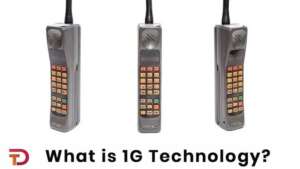
The emergence of the first-generation (1G) mobile network in the 1970s marked the beginning of mobile technology. Mobile phones were invented because to this analog method, which also made voice communication over cellular networks possible. The first commercially available mobile phone, the DynaTAC 8000X from Motorola, was released in 1983. It was heavy, costly, and had a small range of features. Notwithstanding these drawbacks, it paved the way for later advancements and sparked curiosity about the possibilities of wireless communication.
2. Digital Communication and the 2G Revolution
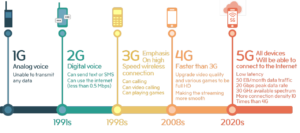
Second-generation (2G) mobile networks were introduced in the 1990s, superseding analog systems with digital technology. Call quality, network bandwidth, and security were all enhanced by this change. Furthermore, short message service (SMS) was offered by 2G networks, enabling text messaging to be transferred between mobile phones. This invention revolutionized communication by making it possible to stay connected more quickly and conveniently.
In the 2G era, phones got more compact, more reasonably priced, and more accessible. One of the top producers, Nokia, rose to prominence in the industry by introducing well-known models like the Nokia 3310. As they become more and more commonplace, mobile phones went from being luxuries to becoming necessary instruments for communication.
3. The Mobile Internet’s 3G Breakthrough
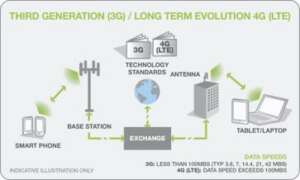
Third-generation (3G) networks were available in the early 2000s, allowing for quicker data transfer and—most importantly—mobile internet access. Mobile phones were never the same after mobile internet became available; they were now incredibly useful tools for emailing, downloading information, and web browsing. There are now more opportunities for mobile apps and services thanks to the transition from basic communication devices to internet-enabled equipment.
As 3G technology developed, smartphones started to take form. In the history of mobile technology, the introduction of products like the BlackBerry and the first-generation iPhone in 2007 was a turning point. With its touch-screen interface and app store, the iPhone changed the game for mobile devices and made a wider variety of apps available.
4. 4G LTE: The Era of Ultrafast Communication
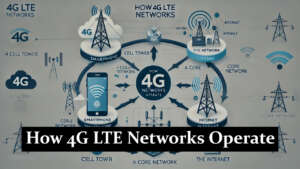
Mobile technology saw yet another transformation with the introduction of LTE (Long Term Evolution) networks in the fourth generation (4G). With the advent of 4G in the late 2000s, internet speeds became considerably quicker, allowing for smooth video calls, mobile gaming, and streaming of high-definition videos. The rise of applications like Instagram, WhatsApp, and YouTube was aided by 4G networks’ dependability and speed.
Smartphones have become widely used, with Apple, Samsung, and Huawei dominating the market. With the incorporation of cutting-edge features like cameras, biometric security, and GPS, cellphones have become indispensable for use in both personal and business contexts. Users are now able to complete tasks that formerly needed a desktop or laptop computer from the convenience of a mobile device because to the combination of powerful technology and fast networks.
5. The 5G Revolution: The Mobile Connectivity of the Future
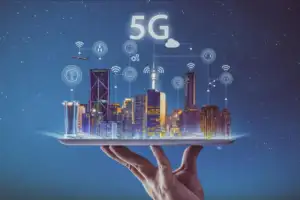
The introduction of fifth-generation (5G) networks is the most recent development in mobile technology. Even faster internet speeds, less latency, and more capacity to accommodate the increasing number of connected devices are what 5G promises to deliver. Smart cities, driverless cars, and the Internet of Things (IoT) are among the advancements that are anticipated to be powered by this new era of mobile connection. Applications that were not before possible, like real-time remote surgery, augmented reality, and sophisticated AI-driven services, will be made possible by 5G’s increased speed and dependability.
Even while 5G is still being deployed in its infancy, it has the potential to drastically alter daily life and several industries. A hyper-connected world is about to come to pass as 5G is poised to reinvent what is possible with mobile technology, from healthcare to entertainment.
Mobile Technology’s Effects

Social Interaction and Communication

The impact of mobile technology on communication has been one of the biggest. Being able to communicate with people from almost anywhere in the world is now feasible thanks to mobile phones. Social media sites, video chatting apps, and instant messaging apps have completely changed the way people communicate, making it easier, faster, and more dynamic.
Particularly social media has been greatly impacted by the development of mobile technologies. Mobile devices are the primary means of accessing social media platforms such as Facebook, Twitter, and Instagram. The incorporation of cameras and mobile internet has contributed to the proliferation of user-generated content. Anyone with a smartphone can now share their ideas, images, and films with a worldwide audience thanks to mobile technology, which has democratized content creation.
Although mobile technology has made everything more connected, social engagement has become more difficult. Due to the ease of staying in touch, there are worries that people are relying too much on digital communication. According to certain research, using a mobile phone excessively can increase the risk of social isolation, anxiety, and other mental health problems.
2. Mobile Business and Commerce

The use of mobile technologies has completely changed how businesses run. Customers can now use their cellphones for online shopping, payment processing, and financial transactions thanks to the growth of mobile commerce, or m-commerce. With just a few touches, managing finances, paying bills, and transferring money is now simpler than ever thanks to smartphone apps like PayPal, Venmo, and Apple Pay.
Mobile technology has become widely used, and e-commerce behemoths like Amazon and Alibaba have benefited from this by making their platforms mobile-friendly. Furthermore, companies of all sizes have created mobile apps to increase sales, improve customer service, and streamline operations. Through social media, SMS, and apps, mobile marketing has grown to be an essential part of contemporary advertising campaigns.
Professional productivity has been transformed by mobile technologies. Working from almost anywhere is now feasible thanks to smartphone apps and cloud-based solutions, which also allow for flexible scheduling and remote work. Teams can communicate and work together more easily when they use tools like Slack, Zoom, and Microsoft Teams, which makes it harder to distinguish between regular office settings and remote working situations.
3. Consumption of Media and Entertainment

Additionally, mobile technology has significantly changed how people consume media and find amusement. The main devices for consuming digital material, such as news, music, films, and games, is now a smartphone. People can now enjoy their favorite TV episodes, songs, and movies on the go thanks to streaming services like Netflix, Spotify, and YouTube that have tailored their offerings for mobile users.
With games like “Candy Crush,” “Fortnite,” and “Pokémon Go” drawing millions of players worldwide, mobile gaming has expanded into a big industry. Due to the smartphones’ incredibly strong hardware and portability, mobile gaming has become a popular kind of entertainment.
Furthermore, mobile technology has changed the way that news is consumed and distributed. Real-time news and updates from around the globe may now be accessed through social media platforms and mobile news apps. Nevertheless, since mobile users are frequently exposed to bogus or misleading content, this change has also aided in the dissemination of false information.
4. Learning and Education
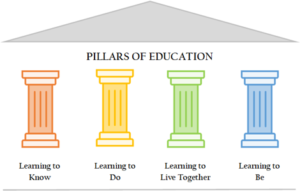
Education has undergone a radical change as a result of mobile technology, which has increased accessibility and flexibility. Access to educational content from mobile devices has been made accessible by e-learning sites like Coursera, Khan Academy, and Duolingo. As a result, education has become more democratic and people from all over the world can now learn new things at their own speed.
Mobile phones have emerged as essential educational tools in poor nations, enabling students to interact with teachers and access course materials even in places with inadequate infrastructure. The emergence of mobile applications that assist students with time management, studying, taking notes, and other duties has further enhanced the usage of mobile technology in the classroom.
Difficulties and Fears
While there are many advantages to mobile technology, there are also many drawbacks. Due to the large amounts of personal data that are stored on mobile devices, including location data, conversation logs, and sensitive financial information, privacy and security are major concerns. Concerns over the security of mobile devices and the preservation of user privacy have been highlighted by the rising frequency of data leaks and cyberattacks.
Furthermore, the digital divide—where certain populations lack access to current mobile devices or dependable internet connections—has been exacerbated by the quick speed at which technology is developing. This disparity is especially noticeable in poorer countries, where a lack of infrastructure makes mobile technology adoption more difficult.
Another developing worry is how mobile technology is affecting the environment. Mobile device manufacturing and disposal add to electronic garbage, or “e-waste,” which is dangerous for the environment and human health. Finding sustainable solutions for the production and disposal of mobile phones is essential as these devices grow more and more ingrained in daily life.
In summary
Unquestionably, mobile technology has changed how we work, interact, learn, and pass the time in today’s world. Continuous innovation and adaptability have characterized the history of mobile technology, from the early days of 1G networks to the bright future of 5G. Even while mobile technology has many advantages, there are some issues that need to be addressed, especially with regard to sustainability, privacy, and security.
Mobile technology will have an ever-greater impact on society as it develops, influencing the future in ways we yet don’t completely understand. Mobile technology is a major force in the digital age because of its endless potential, which range from enhancing global connectivity to enabling new developments.







